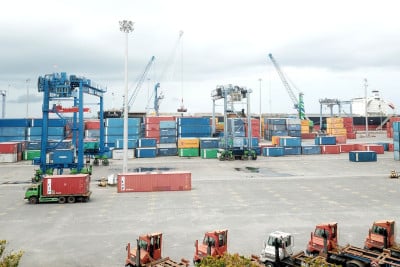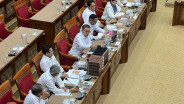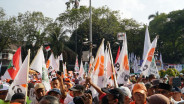JAKARTA: Indonesian economy next year is estimated to surge, thanks to stronger global economic outlook caused by the current business cycle expansion phase.
Chairperson of the National Economic Committee (KEN) Chairul Tanjung revealed historic data showed Indonesian economy usually could expand for an average of seven years. Indonesia entered its expansion phase in March 2009. "So, Indonesian economy will still have its expansion phase until 2016," he informed at a discussion titled Indonesian Economic Outlook 2011 in Jakarta yesterday. Indonesia's economic growth next year, he added, was estimated at 6.4%, with total economic output reaching IDR7,726 trillion (around US$858.4 billion), thanks to better global economic outlook. The KEN forecasts consumption, investment, and export will still drive Indonesia's economic growth next year, creating a more balanced economic growth engine. Household spending is predicted to increase by 5%, government expenditure by 15.5%, and investment (gross fixed capital formation) by 13.4%. "Moreover, the improved global economy in 2010 has significantly bolstered our export performance. Next year, export is estimated to grow by 13%," he said. Chairperson of the Federation of Private Domestic Banks (Perbanas) Sigit Pramono revealed the economic growth potential next year had to be exploited optimally to boost prioritized economic sectors. "The government, the central bank (BI), the banking industry, and economic players have to sit together to reach a consensus on which economic sectors should be prioritized." The sectors, continued Sigit, would receive abundant financing, thanks to the anticipated capital inflow and economic growth in 2011. "If we can boost all sectors, it will be good. Or at least we should have leading industries to prioritize," he said. Sigit inserted all parties should also play their respective role in boosting economic sectors by issuing relevant policies and regulations. "The government should play its role in making fiscal, taxation, custom and excise policies, the central bank should play its role in making monetary policies, and the banking industry should also play its respective role." However, Indonesia's economic growths this year and next year are predicted not to be as high as expected, hitting even lower points than other developing countries. This is the conclusion of a focus group discussion held by some economists at the Indonesian Economists Association (ISEI). Indonesian economy is only estimated to grow 5,9% this year and 6%-6.4% next year. Secretary General of the ISEI Anggito Abimanyu disclosed floor economic growth limit was fixed at 6% since the investment sector had not yet improved. "If we want to see our economic growth surging, sources of investment have to increase. During the discussion, some were still of opinion that Indonesia had not yet found its investment sector improved." Moreover, he inserted, the declining global economic growth forecast would also affect Indonesia's economic growth next year. "Consumption will remain the main driver. However, export will also be steady, thanks to the global economic recovery." Potential instability Sri Adiningsih, a member of ISEI from Gadjah Mada University, viewed the potential of economic instability or vulnerability next year would be higher than this year. Global economic environment next year would not be as good as this year, making it difficult for Indonesia to maintain domestic economic stability. "Competition to attract global investments will be more difficult since China will issue more bonds and shares, thus, boosting risk threat," she said. She further told that the potential to boost economic growth next year would not be significant since there would be no essential global economic growth in 2011. Export growth was estimated to decline and so would commodity prices. "Therefore, Indonesian economy in 2011 will grow, but not significant," cited Adiningsih. Didik J. Rachbini, another member of the ISEI, added Indonesia was not able to optimally take advantage of the global economic growth and soaring commodity price momentums in 2010 due to the government's unfavorable policies. "Our economy will slightly increase next year. This is not optimal since we actually have the momentum. Unfortunately, the factors of state bureaucracy, political process, and political market have not been favorable," he explained. The ISEI estimates economic growth for 2010 at 5.9%, year-on-year inflation at 6.5%, and the rupiah exchange rate against the US dollar at IDR9,000. For 2011, the ISEI projects economic growth at 6%-6,4%, and inflation at 6.2%-6.7% due to government policies on the food sector, especially on rice, and on uncertain base electricity tariffs and fuel prices. The rupiah exchange rate against the US dollar is estimated at IDR8,900-IDR9,100, budget deficit at 1.5% of GDP, foreign exchange reserves at US$104 billion-US$109 billion, the benchmark BI Rate at 6.5%-6.75%, and the Composite Stock Index (IHSG) at 4,200. (14/20/aca/wiw)















